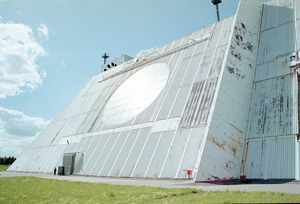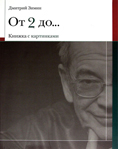I think that goats now graze at the testing ground, marveling at the ruins of those gigantic structures.
And this, guys, is not a step backwards, it is progress.
The structural deficiencies of the Soviet system Ц the absence of private property and competition Ц revealed themselves nowhere as strikingly as in the booming sphere of radio-electronics, and information and computer technology. Two serious flaws were readily apparent:
Ц The complete inability on the part if its one and only client, the all-planning nomenclature of the ruling elite, to formulate proper technical requirements for the engineers when designing new technology;
Ц The very low level of organization of technical and scientific work in domestic scientific research institutes, plants, and among engineers in general; deprived of tough schooling in survival or the ability to grow their knowledge base in the everyday struggles that are part of any competitive marketplace (incidentally, hence follows a rule that no state business should go to a company that hasnТt proven itself in a competitive, and usually civilian, market).
The catastrophic lag in home electronics and information and computer technology couldnТt help but lead to military radio-electronics also falling behind. According to the memoirs of people active in military industry, this lag, however, didnТt have a negative impact on the unique engineering developments at RTI, and in particular the one of its kind RRS of the Moscow Anti-Missile Defense System.
The RTI director and the chief design engineer of this RRS Victor Sloka writes: УThe radio radar Don-2N has characteristics that have no match. The U.S. does not possess radio radar able to match the Don-2N in distance, precision, and capability of tracking and selecting small targets in space.Ф (Mikhail Pervov. The Way The Russian Space And Rocket Defense Was Created. Moscow, Avarius XXI, 2004).
 I am especially pleased to read this kind of account, for I also took part in the creation of the record-setting RRS, having been the deputy Chief Design Engineer in antenna reception systems, and having received the State Award for that. It is nice to remind myself that, although Soviet design of computers, TV sets, tape recorders and other home electronic junk never set any world records, we at RTI have Ц in the area of radio radar AMD. It would be nice, though, to hear it not just from its civilian and military creators Ц but I havenТt come across any independent assessments.
I am especially pleased to read this kind of account, for I also took part in the creation of the record-setting RRS, having been the deputy Chief Design Engineer in antenna reception systems, and having received the State Award for that. It is nice to remind myself that, although Soviet design of computers, TV sets, tape recorders and other home electronic junk never set any world records, we at RTI have Ц in the area of radio radar AMD. It would be nice, though, to hear it not just from its civilian and military creators Ц but I havenТt come across any independent assessments. And one more thing: havenТt we tried to set a record in an area (AMD of a megapolis) in which no one is competing with us, nor even planning to compete?
At the end of November, 2004 I suddenly ran into Leonid Zorin, whom I hadnТt seen for decades. 40 years ago he had been a very young lab director in a specialized department when I started my career at RTI. He enjoyed the unconditional and, I thought, deserved liking of Mintz.
I asked him to read my memoir and express his opinion. Soon I received it, and with his permission am offering it to you in full:
IТve read your article and got very emotional. I couldnТt fall asleep for a long time. I want to say two things:
I want to say two things:
First: you say nothing about Alexander Lvovich as a generator of STRATEGIC ideas. I think this should not be left out of your writings, even though they are dedicated to other subjects.
Two things:
Х When the experimental radar stations were initially being tested by the Academy of Sciences (and not by RTI; Alexander Lvovich wasnТt very fond of RTI), Alexander Lvovich understood the hopelessness of creating AMD while under a mass attack; he saw the need to search for a different solution. He, as far as I know, was the first to suggest to the government the idea of building a missile attack warning system. He wrote in his letter to Ustinov, who at the time represented the military industry, of the need to create a Уsystem of intelligenceФ to ensure the inevitability of a retaliatory attack. IТve read this short letter; you may be able to still find it in the archives of the Academy. The term УintelligenceФ is from this letter.
Х It was Alexander Lvovich who, while analyzing our research, had said that the wavelength should be shorter than the one we were considering. A shorter wavelength was the decisive factor in our establishing a clear lead in the competition and it was the foundation of the achievements that followed.
Second. The greatness of Alexander Lvovich consists, among other things, in his being able to build up the Institute and the creative atmosphere that reigned there, despite all the efforts of the Party Central Committee to get rid of a leader who was not a party member, and whom they were having a very hard time making stand at attention. (And there were definitely attempts to find a convenient excuse. The first to write to the KGB, with accusations similar to those of Roman, was V.M. Lupulov. This was back in the lab of the Soviet Academy of Sciences. There were other Уcaretakers of securityФ, too). The ability of Alexander Lvovich to foster a creative atmosphere under trying circumstances is very little shown in your article, but it may be I am mistaken. Except IТve never seen anything like this anywhere, perhaps only in P. L. Kapitsa and I.V. Kurchatov, whose portraits were always hanging in Alexander LvovichТ office. (Not for the article, but for yourself, try to remember if youТd ever heard any criticism of Lupulov from Alexander Lvovich.)
L. Zorin.
P.S. Alexander Lvovich was indeed condemned three times, and pardoned only twice. He was released in a very curious fashion, with a sort of a Уforesight,Ф but this does not belong in this article. When I have a chance, I can tell you what I heard about it from Veisbein.
V.S. Kelzon and some others spoke out in stronger terms during the work of the commission on RomanТs letter, but itТs not worth mentioning. Although this confirms yet again Alexander LvovichТs ability to make people with completely different interests work creatively together.
Forgive me, speaking of A.L. Mintz I cannot rid myself of a certain pathos.
I canТt pass over the Уcomplicated relationship between Mintz and Kisunko.Ф I suspect that Roman wrote his letter to the KGB not without his influence. More: at one of the meetings presided over by V.I. Markov, among others spoke Lev Glinkin Ц a Уkind soulФ indeed. Speaking after Lev Glinkin, Kisunko УmistakenlyФ called him Glikman. I can assure that these were so called Уscientific argumentsФ, which were heard at the Ministry of Radio Industry at the minimum. There are examples of this. But those who werenТt trying to cover up their mistakes, unavoidable in new engineering designs, spoke in different terms. I remember how at the council of Military Industry the developers of missile radio-defense said literally: УAnd we donТt know what to do with the CSO-P station: the moment it turns on, the active interference transmitters turn themselves off.Ф
The majority of these notes were written for an anthology or the memoirs of A.L. Mintz, and so are, to some degree, a Уcomposition on a given theme.Ф In the process of writing it, whole seemingly firmly forgotten episodes of life at RTI already after Mintz have surfaced. I also found a lot of photographs, and here are some of them, continuing on the subject of directors.



